外研版(2019)必修 第一册Unit 3 Family matters Using language课件 (共46张PPT)
文档属性
| 名称 | 外研版(2019)必修 第一册Unit 3 Family matters Using language课件 (共46张PPT) | 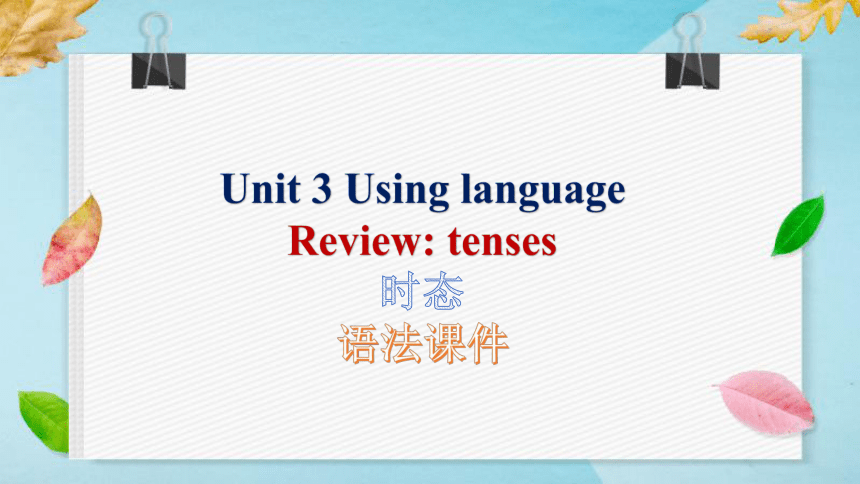 | |
| 格式 | pptx | ||
| 文件大小 | 15.9MB | ||
| 资源类型 | 教案 | ||
| 版本资源 | 外研版(2019) | ||
| 科目 | 英语 | ||
| 更新时间 | 2024-10-10 16:50:05 | ||
图片预览

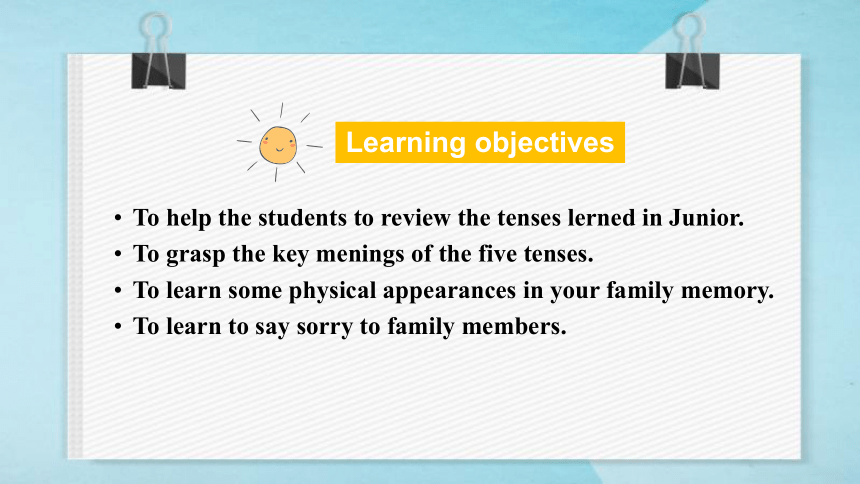
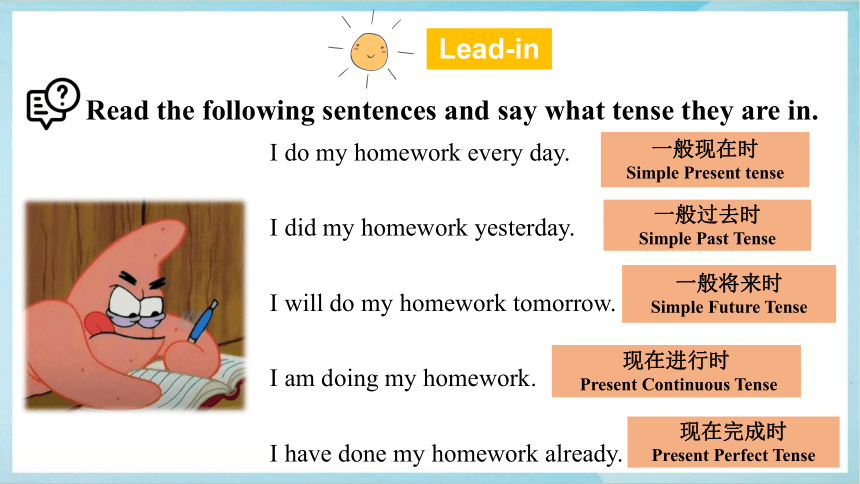
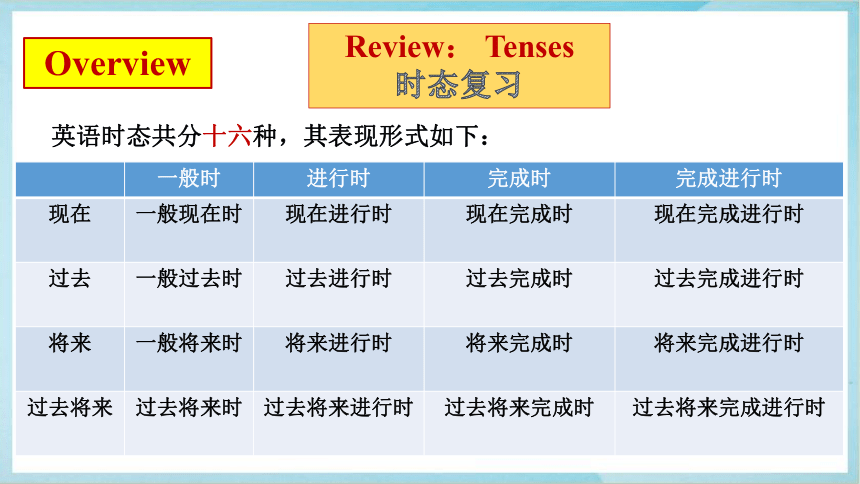
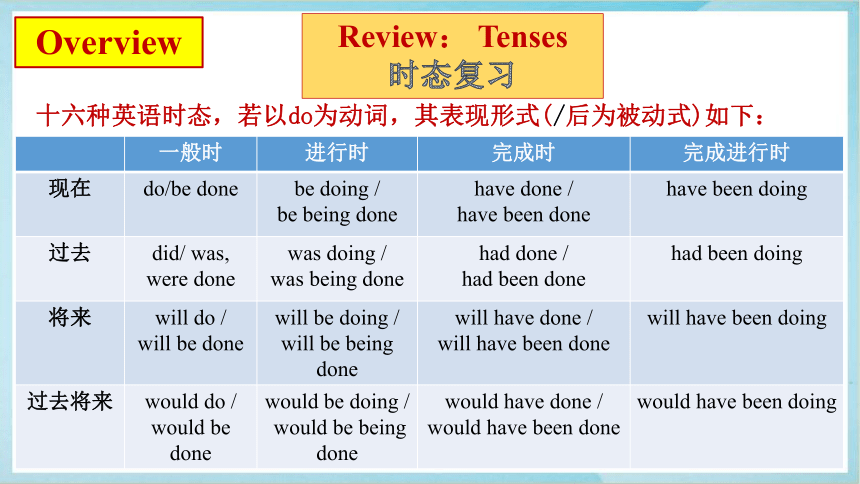
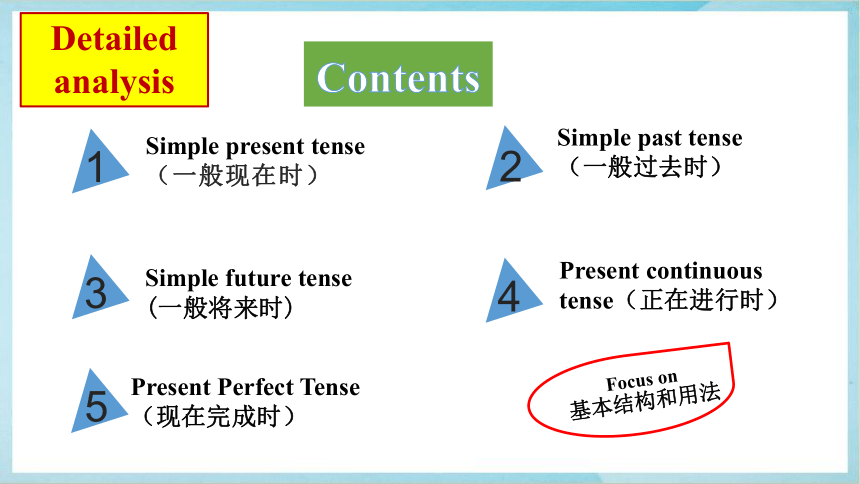
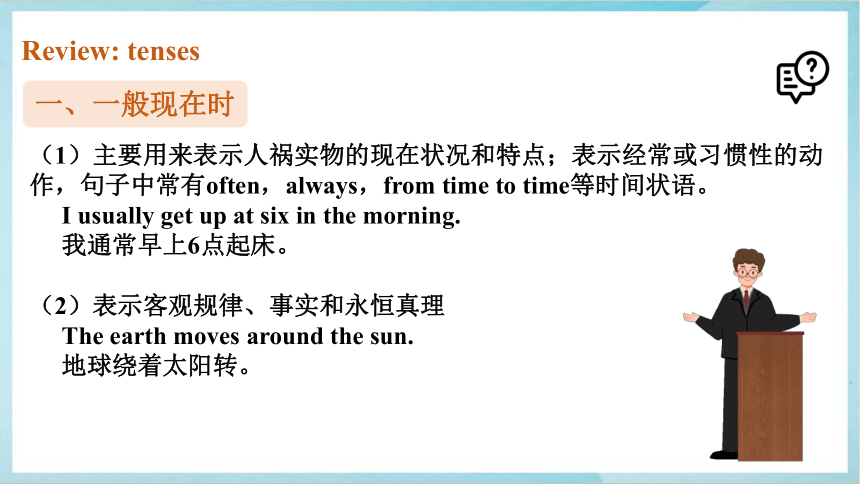
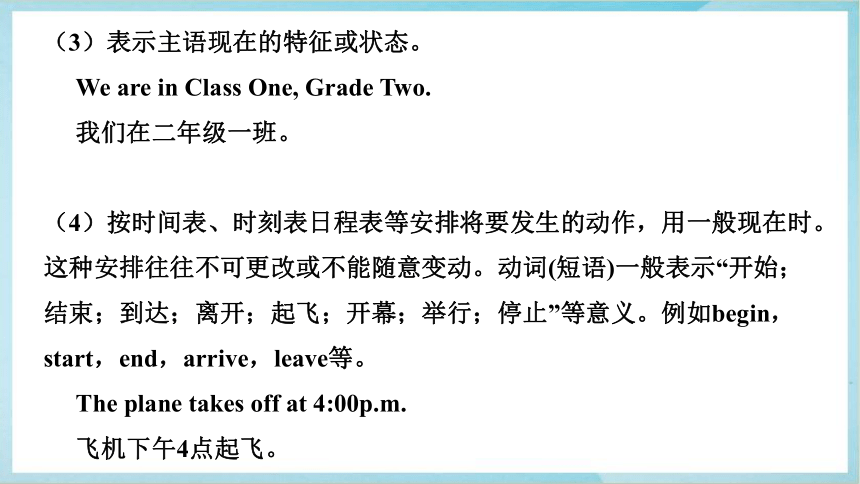
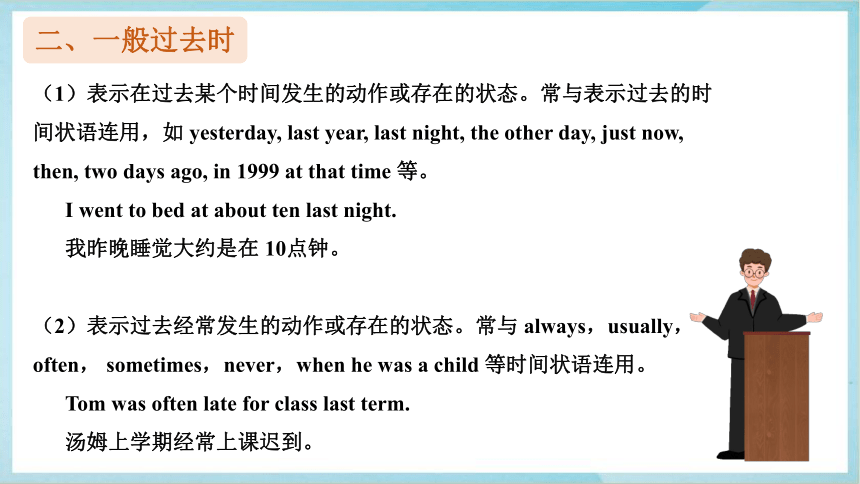
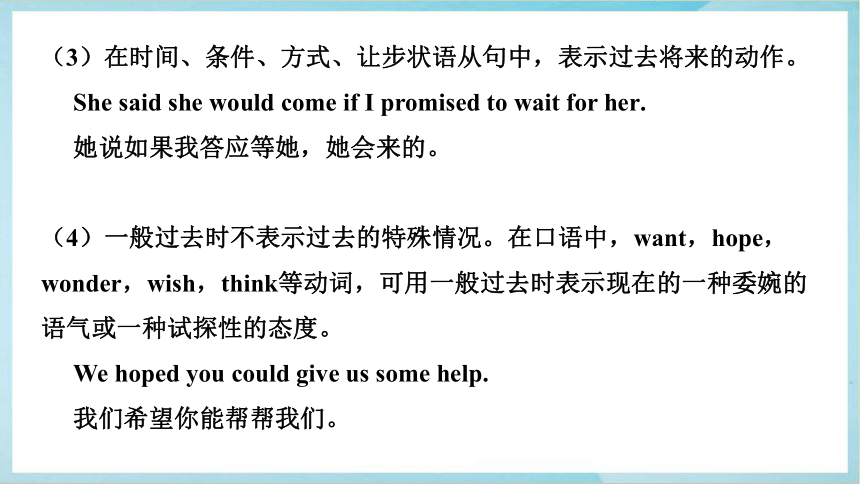
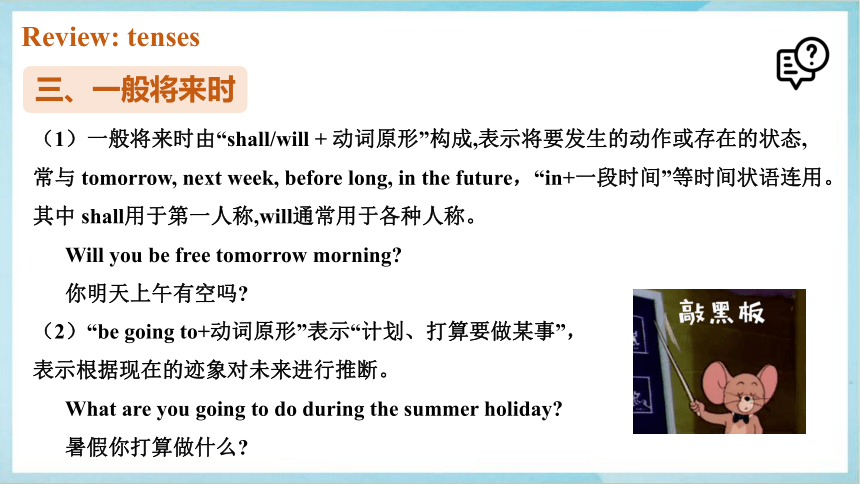
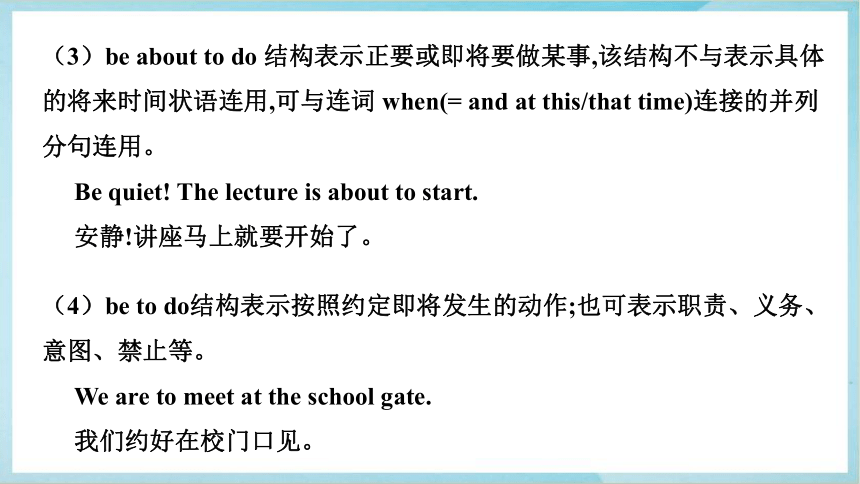
文档简介
(共46张PPT)
Unit 3 Using language
Review: tenses
时态
语法课件
To help the students to review the tenses lerned in Junior.
To grasp the key menings of the five tenses.
To learn some physical appearances in your family memory.
To learn to say sorry to family members.
Learning objectives
Read the following sentences and say what tense they are in.
I do my homework every day.
I did my homework yesterday.
I will do my homework tomorrow.
I am doing my homework.
I have done my homework already.
一般现在时
Simple Present tense
一般过去时
Simple Past Tense
一般将来时
Simple Future Tense
现在进行时
Present Continuous Tense
现在完成时
Present Perfect Tense
Lead-in
Review: Tenses
时态复习
英语时态共分十六种,其表现形式如下:
一般时 进行时 完成时 完成进行时
现在 一般现在时 现在进行时 现在完成时 现在完成进行时
过去 一般过去时 过去进行时 过去完成时 过去完成进行时
将来 一般将来时 将来进行时 将来完成时 将来完成进行时
过去将来 过去将来时 过去将来进行时 过去将来完成时 过去将来完成进行时
Overview
Review: Tenses
时态复习
十六种英语时态,若以do为动词,其表现形式(/后为被动式)如下:
一般时 进行时 完成时 完成进行时
现在 do/be done be doing / be being done have done / have been done have been doing
过去 did/ was, were done was doing / was being done had done / had been done had been doing
将来 will do / will be done will be doing / will be being done will have done / will have been done will have been doing
过去将来 would do / would be done would be doing / would be being done would have done / would have been done would have been doing
Overview
2
Simple past tense
(一般过去时)
4
Present continuous tense(正在进行时)
1
Simple present tense
(一般现在时)
3
Simple future tense
(一般将来时)
Contents
5
Present Perfect Tense(现在完成时)
Focus on
基本结构和用法
Detailed analysis
(1)主要用来表示人祸实物的现在状况和特点;表示经常或习惯性的动作,句子中常有often,always,from time to time等时间状语。
I usually get up at six in the morning.
我通常早上6点起床。
(2)表示客观规律、事实和永恒真理
The earth moves around the sun.
地球绕着太阳转。
Review: tenses
一、一般现在时
(3)表示主语现在的特征或状态。
We are in Class One, Grade Two.
我们在二年级一班。
(4)按时间表、时刻表日程表等安排将要发生的动作,用一般现在时。这种安排往往不可更改或不能随意变动。动词(短语)一般表示“开始;结束;到达;离开;起飞;开幕;举行;停止”等意义。例如begin,start,end,arrive,leave等。
The plane takes off at 4:00p.m.
飞机下午4点起飞。
(1)表示在过去某个时间发生的动作或存在的状态。常与表示过去的时间状语连用,如 yesterday, last year, last night, the other day, just now, then, two days ago, in 1999 at that time 等。
I went to bed at about ten last night.
我昨晚睡觉大约是在 10点钟。
(2)表示过去经常发生的动作或存在的状态。常与 always,usually,often, sometimes,never,when he was a child 等时间状语连用。
Tom was often late for class last term.
汤姆上学期经常上课迟到。
二、一般过去时
(3)在时间、条件、方式、让步状语从句中,表示过去将来的动作。
She said she would come if I promised to wait for her.
她说如果我答应等她,她会来的。
(4)一般过去时不表示过去的特殊情况。在口语中,want,hope,wonder,wish,think等动词,可用一般过去时表示现在的一种委婉的语气或一种试探性的态度。
We hoped you could give us some help.
我们希望你能帮帮我们。
(1)一般将来时由“shall/will + 动词原形”构成,表示将要发生的动作或存在的状态,常与 tomorrow, next week, before long, in the future,“in+一段时间”等时间状语连用。其中 shall用于第一人称,will通常用于各种人称。
Will you be free tomorrow morning
你明天上午有空吗
Review: tenses
(2)“be going to+动词原形”表示“计划、打算要做某事”,表示根据现在的迹象对未来进行推断。
What are you going to do during the summer holiday
暑假你打算做什么
三、一般将来时
(3)be about to do 结构表示正要或即将要做某事,该结构不与表示具体的将来时间状语连用,可与连词 when(= and at this/that time)连接的并列分句连用。
Be quiet! The lecture is about to start.
安静!讲座马上就要开始了。
(4)be to do结构表示按照约定即将发生的动作;也可表示职责、义务、意图、禁止等。
We are to meet at the school gate.
我们约好在校门口见。
(1)表示说话时正在进行的动作。即此时此刻正在进行的动作,常与 now,right now,at the moment, at present等时间状语及 look, listen 等标志词连用。
We are having an English lesson now.
我们现在正在上英语课。
Review: tenses
(2)表示现阶段正在进行的动作。这种用法表示目前一段时间内在做某一件事,但说话时未必正在做。常与表示最近一段时间的状语连用,如 these days, this week 等。
How are you getting on with your essay these days
这些天来你的论文进展如何
四、现在进行时
(3)某些“终止性动词”(finish,die,open,close,start,join,meet 等)和“位移动词(短语)”(come,go,leave,arrive,fly,start,return,take,take off 等),可以用现在进行时表示将来发生的动作。这时,句中一般有表示将来的时间状语。
The old worker is retiring next year. (这位老工人明年就要退休了。)
(4)表示根据计划或安排将要发生的动作。这类结构主语往往是人,常与表示将来的时间状语连用。
I am having dinner with John tomorrow evening.(我明天晚上要跟约翰吃饭。)
(5)表示反复出现的或习惯性的动作,往往含有赞赏、厌恶、遗憾等情绪,常与always,continually,constantly,forever, all the time 等连用。
Mary is always thinking of others first.(玛丽总是先想到别人)
(1)现在完成时的构成为 have/has+done。表示过去开始的动作或存在的状态,一直延续到现在。
How long have you waited here
你在这儿等了多久 。
Review: tenses
(2)表示发生在过去的动作或存在的状态或者在说话时刚刚结束的动作,对现在仍有影响。
Have you returned the book
你还书了吗
五、现在完成时
Exercise
1. Jack ________ swimming in the river every day in summer. (go)
2. Look, the children ____________ basketball on the playground. (play)
3. It is very wet and cold. I think it________________. (rain)
4. I didn't meet him. He ________ when I got there. (leave)
5. He is very hungry. He_____________ anything for three days. (not eat)
6. I ________ with you if I have time. (go)
7. We ________ good friends since we met at school. (be)
goes
are playing
is going to rain
had left
hasn't eaten
will go
have been
A.
present
future
past
一般现在时
B.
present
future
past
一般过去时
C.
present
future
past
一般将来时
D.
present
future
past
正在进行时
主+ be(am, is, are)
/ 主+ do/ does
主+ was/were
/ 主+ did
主+ will do
/ 主+ be going to do...
主+ am/is/are doing
Summary
Tense exercises in Using language
Page 38--39
Analysis
Using language
Look at the sentences from the reading passage.
Decide which tense each is in and match the tenses to what they describe.
1
Analysis
Now match the sentences to the correct timelines and find more examples of these sentences in the reading passage.
1
Using language
Analysis
Complete the dialogue with the correct form of the words and experessions in brackets.
Dad: Adam, Sally, come here. Mom ____ (have) something to tell you.
Adam: Coming.
Sally: I ______ (call) Grandma yesterday and invited her to our house this Sunday. We _________________________ (throw) her a big birthday party! So, we each need to choose a present.
Adam: I know --- I _______________________ (give) her a new tea set. She ______ (like) drinking tea!
Mom: Good choice. What about you, Sally
Sally: I ____________ (think of) making a scarf for her.
Mum: Good idea. I’m sure Grandma ________ (love) it. Oh, ______ you ________ (finish) the guest list yet, dear
Dad: Yes, I have, and I’m working on the invitations.
Mum: Ok. So we still need to prepare food and drinks. I’ll make a checklist.
has
called
will throw/ am going to throw
will give/ am going to give
likes
am thinking of
will love
have
finished
2
Using language
Analysis
Look at the checklist for Grandma’s birthday party and talk about the preparations. Use as many of the tenses in Activity 1 as possible.
They have decided to throw a party to celebrate Grandma’s birthday...
They have chosen presents for grandma.
Dad drew up the guest list on Wednesday, and he is now making the invitations.
Mum will prepare food and drinks for the party on Sunday morning.
...
3
Analysis
Read the email and answer the questions.
4
Physical appearances
Physical appearances
Read the email and answer the questions.
4
From Penny To Anna
Subject A family memory
Hi Anna,
Great to hear from you! Yes, we had a fantastic hol;iday.Mum, Dad and I went camping in Beidaihe. In fact, we stayed at the same campsite as we did ten years ago. Dad showed me a photo we had taken then --- just see how times flies!
Dad has changed quite a bit! In his thirties, he was quite thin and pale, and he had red, bushy hair.Nowadays, he’s well-built and tanned. He’s alawys had a square jaw, but now he’s grown a beard. Strangely, his beard is still red even though his hair is turning grey!
Mum looks almost the same, though. She still has smooth skin and straight black hair, and jogging has kept her slim and fit.
I still have ligjht skin and black hair, of course. But I usually wear my hair in a ponytail these days as it has got a lot longer. Mun sauys I had cute rosy cheeks, but now I have freckles. I think they are kind of cute too, right
Can’t wait to see you back in school!
Penny
外貌
Read the email and answer the questions.
4
来自 佩妮 写给 安娜
标题 家庭记忆
嗨,安娜,
很高兴收到你的来信!是的,我们度过了一个美妙的假期。妈妈,爸爸和我去北戴河露营。事实上,我们和十年前住在同一个露营地。爸爸给我看了一张我们当时拍的照片——看看时间过得真快!
爸爸变了好多!三十多岁时,他又瘦又白,头发又红又浓密。如今,他身材魁梧,皮肤晒得黝黑。他一直是方下巴,但现在留起了胡子。奇怪的是,虽然他的头发已经变白了,但他的胡子还是红的!
不过妈妈看起来几乎没变。她仍然有光滑的皮肤和直的黑发,慢跑使她保持苗条康健。
当然,我仍然有浅色的皮肤和黑色的头发。但是这些天我通常把头发扎成马尾,因为我的头发变长了。妈妈说我有可爱的红润的脸颊,但现在我有了雀斑。我觉得它们也挺可爱的,对吧
迫不及待地要看到你回学校了!
佩妮
Read the email and answer the questions.
1 What did Pennys dad look like ten years ago
2 What does Penny’s mum look like now and why
3 How does Penny look different now compared to ten years ago
He was quite thin and pale. He had red, bushy hair and a square jaw.
She looks almost the same as she did ten years ago, with smooth skin and straight black hair, because jogging has kept her slim and fit.
Her hair has got longer and she wears it in a ponytail. She also has freckles on her cheeks now.
Underline the words and expressions used to describe appearances in Activity 4 and put them into the table. Add any more you can think of.
square jaw
red beard
rosy cheeks
Freckles
thick lips
round face
handsome
red bushy
grey straight
black ponytail
long curly
loose
pale
tanned
smooth
light
shallow
wrinkled
thin
well-built
slim fit
stout skinny overweight
broad-shouldered
5
Work in pairs and describe how your family members’ physical appearances have changed.
My mother was / had...
Now she is / has got...
6
1989年12月8日,第44届联合国大会通过一项决议,宣布1994年为国际家庭年,1993年纽约特别会议提出从1994年起每年5月15日定为国际家庭日(International Day of Families),以此提高各国政府决定和公众对于家庭问题的认识,促进家庭的和睦、幸福和进步。
Saying sorry to family members
Saying sorry to family members
The International Day of Families, which was set by the United Nations in 1993, is held on 15 May every year. The day celebrates the importance of families. It aims to deepen people’s understanding of issues that are related to families. With a different theme each year, the day is observed with a wide range of events that are organised at local, national and internaational levels.
向家人道歉
国际家庭日是联合国于1993年确定的,每年5月15日举行。这一天庆祝家庭的重要性。它旨在加深人们对与家庭有关的问题的理解。每年都有不同的主题,在地方、国家和国际各级组织各种各样的活动来纪念这一天。
Saying sorry to family members
Listen to the conversation and choose the feelings that the speakers express.
angry
sad
embarrassed
sorry
confused
happy
Alice felt sad because her mother missed her school play.
Alice’s mother felt sorry because she was too busy and forgot Alice’s school play.
They felt happy in the end because they decided to go to the countryside the next week.
Alice’s journal entry
Saturday 22 September
Today, I was in a school play, but Mum missed it. Later, on the phone she apologised and explained that she was busy with work because someone was off sick. I wish she had come!
I know she’s been busy recently, and I understand that. I’m just worried about her. I don’t like seeing her so tired and pale.
I think she needs to take some time off work to relax.
I told her my worries. To make up for it, next week we plan to go the countryside together. We’ll go camping and have a picnic. Most importantly, we’ll have time to talk and catch up. I’m really looking forward to it!
Page 41
爱丽丝的日记
9月22日星期六
今天,我参加了学校的话剧表演,但是妈妈错过了。后来,她在电话里道歉,并解释说她工作很忙,因为有人请了病假。她要是来了就好了!
我知道她最近很忙,我理解。我只是担心她。我不喜欢看到她如此疲惫和苍白。
我想她需要休息一段时间放松一下。
我告诉她我的烦恼。作为补偿,下周我们计划一起去农村。我们将去露营和野餐。最重要的是,我们有时间聊聊,叙叙旧。我真的很期待!
Listen again and complete Alice’s journal entry.
school play
off sick
tired and pale
relax
countryside
picnic
catch up
Work in pairs.
Act out the conversation to apologise to a family member.
student A
You’re Student B’s son / daughter. Student B asked you to teach him / her how to use a new app to take photos. You started to help but soon became very impatient. Now, you feel sorry about your behaviour. Apologise to Student B and make up.
student B
You’re Student A’s father / mother. You wanted to learn how to use a new photo-taking app, so you asked Student A for help. However, he / she was very impatient. Now Student A wants to apologise to you. Accept the apology and comfort him / her.
Learning to learn
Placing strees on particular words can have a big impact on the meaning and strength of apologies. For example, saying “I am sorry” has more of an impact than “I’m sorry”. Another way of strengthening an apology is by using and strtessing adverbs: I’m really sorry. I’m so sorry.
学会学习
强调特定的词语会对道歉的意义和力度产生很大的影响。例如,说“I am sorry”比“I 'm sorry”更有影响力。另一种强化道歉的方法是使用和强调副词: I 'm really sorry。我很抱歉。
【Saying sorry to family members向家人道歉】P40-41
1.off sick生病请假;休病假
We'll have to work all the harder with two people off sick.
有两个人病了没上班,所以我们的加把劲干。
June is a day off sick today.简今天请了一天病假。
He took a day off sick.他请了一天病假。
▲take some time off work请一段时间假;休一段时间假
I think she needs to take some time off work to relax.
我认为她需要请一段时间假来放松一下。
2. tired and pale萎靡不振;疲惫不堪,面色苍白
She slept badly, awake tired and pale. 她睡不好,醒来满身疲惫,面色苍白。
I did what I could to comfort her, but she looked so tired and pale that I persuaded her to go to her room and rest, promising to return the next day. 我尽力安慰她,但她还是显得萎靡不振。我只得劝她回屋休息,并答应第二天再去看她。
3.make up弥补,补偿;补足;化妆;编造;组成
They'll have to make up time lost during the strike.
他们将不得不补上因罢工失去的时间。
Can I leave early this afternoon and make up the time tomorrow
我今天下午早点儿走,明天补上这段时间,可以吗?
I think it's verty unkind of you to make up stories about him.
我认为你编造关于他的故事是很不友好的。
▲make up for补偿,弥补
Nothing can make up for the loss of a child.
失去一个孩子是任何东西都无法弥补的。
After all the delays, we were anxious to make up for lost time.
耽搁了这么久,我们急着想弥补失去的时间。
4.most importantly最重要的是;最为重要的是
Most iportantly, it was quick, easy, and free.
最重要的是,它快捷,容易而且免费。
And most importantly, once you achieve your goal, reward yourself!
而且最重要的是,一旦达到目标,就奖励你自己。
5.catch up (with)/on 赶上;追上;朋友小聚 ,叙旧
Go on ahead. I'll catch up with you.你先走,我随后赶上你。
China may be racing to catch up.中国或许正在加紧赶上。
You should at least spend two hours in the evening studying in order to
catch up with your classmates.
为了赶上同学,你晚上至少应该花两个小时学习。
The ladies spent some time catching up on each other's health and families.
女士们花了些时间聊聊彼此的健康和家庭情况。
They two are good friends and often catch up now and then.
他们两个是好朋友并且时不时地小聚一下。
6.place/put stree on sth. 强调某事;把重点放在... ...上
You should place stress on this problem.你应该强调这个问题。
They place too much stress on money and position.他们太看重金钱和地位了。
Stress should be put on the prevention of diseases.
疾病应以预防为主。《新英汉大辞典》
More stress should be placed on the cultivation of creativity.
应该更加强调创造力的培养上。
7. have an impact/influence/effect on sth. 对... ... 有影响
Playing games have a bog impact on the study of your school subjects.
玩游戏对你的学业学习有很大的影响。
She was a bright woman who could have an impact on young people.
她是一个聪明的女子,对年轻人能够产生影响。
Libya will have an impact on NATO too. 利比亚将同时对北约产生影响。
Write a passage to talk about a problem that has come up between you and your friends.
Homework
Unit 3 Using language
Review: tenses
时态
语法课件
To help the students to review the tenses lerned in Junior.
To grasp the key menings of the five tenses.
To learn some physical appearances in your family memory.
To learn to say sorry to family members.
Learning objectives
Read the following sentences and say what tense they are in.
I do my homework every day.
I did my homework yesterday.
I will do my homework tomorrow.
I am doing my homework.
I have done my homework already.
一般现在时
Simple Present tense
一般过去时
Simple Past Tense
一般将来时
Simple Future Tense
现在进行时
Present Continuous Tense
现在完成时
Present Perfect Tense
Lead-in
Review: Tenses
时态复习
英语时态共分十六种,其表现形式如下:
一般时 进行时 完成时 完成进行时
现在 一般现在时 现在进行时 现在完成时 现在完成进行时
过去 一般过去时 过去进行时 过去完成时 过去完成进行时
将来 一般将来时 将来进行时 将来完成时 将来完成进行时
过去将来 过去将来时 过去将来进行时 过去将来完成时 过去将来完成进行时
Overview
Review: Tenses
时态复习
十六种英语时态,若以do为动词,其表现形式(/后为被动式)如下:
一般时 进行时 完成时 完成进行时
现在 do/be done be doing / be being done have done / have been done have been doing
过去 did/ was, were done was doing / was being done had done / had been done had been doing
将来 will do / will be done will be doing / will be being done will have done / will have been done will have been doing
过去将来 would do / would be done would be doing / would be being done would have done / would have been done would have been doing
Overview
2
Simple past tense
(一般过去时)
4
Present continuous tense(正在进行时)
1
Simple present tense
(一般现在时)
3
Simple future tense
(一般将来时)
Contents
5
Present Perfect Tense(现在完成时)
Focus on
基本结构和用法
Detailed analysis
(1)主要用来表示人祸实物的现在状况和特点;表示经常或习惯性的动作,句子中常有often,always,from time to time等时间状语。
I usually get up at six in the morning.
我通常早上6点起床。
(2)表示客观规律、事实和永恒真理
The earth moves around the sun.
地球绕着太阳转。
Review: tenses
一、一般现在时
(3)表示主语现在的特征或状态。
We are in Class One, Grade Two.
我们在二年级一班。
(4)按时间表、时刻表日程表等安排将要发生的动作,用一般现在时。这种安排往往不可更改或不能随意变动。动词(短语)一般表示“开始;结束;到达;离开;起飞;开幕;举行;停止”等意义。例如begin,start,end,arrive,leave等。
The plane takes off at 4:00p.m.
飞机下午4点起飞。
(1)表示在过去某个时间发生的动作或存在的状态。常与表示过去的时间状语连用,如 yesterday, last year, last night, the other day, just now, then, two days ago, in 1999 at that time 等。
I went to bed at about ten last night.
我昨晚睡觉大约是在 10点钟。
(2)表示过去经常发生的动作或存在的状态。常与 always,usually,often, sometimes,never,when he was a child 等时间状语连用。
Tom was often late for class last term.
汤姆上学期经常上课迟到。
二、一般过去时
(3)在时间、条件、方式、让步状语从句中,表示过去将来的动作。
She said she would come if I promised to wait for her.
她说如果我答应等她,她会来的。
(4)一般过去时不表示过去的特殊情况。在口语中,want,hope,wonder,wish,think等动词,可用一般过去时表示现在的一种委婉的语气或一种试探性的态度。
We hoped you could give us some help.
我们希望你能帮帮我们。
(1)一般将来时由“shall/will + 动词原形”构成,表示将要发生的动作或存在的状态,常与 tomorrow, next week, before long, in the future,“in+一段时间”等时间状语连用。其中 shall用于第一人称,will通常用于各种人称。
Will you be free tomorrow morning
你明天上午有空吗
Review: tenses
(2)“be going to+动词原形”表示“计划、打算要做某事”,表示根据现在的迹象对未来进行推断。
What are you going to do during the summer holiday
暑假你打算做什么
三、一般将来时
(3)be about to do 结构表示正要或即将要做某事,该结构不与表示具体的将来时间状语连用,可与连词 when(= and at this/that time)连接的并列分句连用。
Be quiet! The lecture is about to start.
安静!讲座马上就要开始了。
(4)be to do结构表示按照约定即将发生的动作;也可表示职责、义务、意图、禁止等。
We are to meet at the school gate.
我们约好在校门口见。
(1)表示说话时正在进行的动作。即此时此刻正在进行的动作,常与 now,right now,at the moment, at present等时间状语及 look, listen 等标志词连用。
We are having an English lesson now.
我们现在正在上英语课。
Review: tenses
(2)表示现阶段正在进行的动作。这种用法表示目前一段时间内在做某一件事,但说话时未必正在做。常与表示最近一段时间的状语连用,如 these days, this week 等。
How are you getting on with your essay these days
这些天来你的论文进展如何
四、现在进行时
(3)某些“终止性动词”(finish,die,open,close,start,join,meet 等)和“位移动词(短语)”(come,go,leave,arrive,fly,start,return,take,take off 等),可以用现在进行时表示将来发生的动作。这时,句中一般有表示将来的时间状语。
The old worker is retiring next year. (这位老工人明年就要退休了。)
(4)表示根据计划或安排将要发生的动作。这类结构主语往往是人,常与表示将来的时间状语连用。
I am having dinner with John tomorrow evening.(我明天晚上要跟约翰吃饭。)
(5)表示反复出现的或习惯性的动作,往往含有赞赏、厌恶、遗憾等情绪,常与always,continually,constantly,forever, all the time 等连用。
Mary is always thinking of others first.(玛丽总是先想到别人)
(1)现在完成时的构成为 have/has+done。表示过去开始的动作或存在的状态,一直延续到现在。
How long have you waited here
你在这儿等了多久 。
Review: tenses
(2)表示发生在过去的动作或存在的状态或者在说话时刚刚结束的动作,对现在仍有影响。
Have you returned the book
你还书了吗
五、现在完成时
Exercise
1. Jack ________ swimming in the river every day in summer. (go)
2. Look, the children ____________ basketball on the playground. (play)
3. It is very wet and cold. I think it________________. (rain)
4. I didn't meet him. He ________ when I got there. (leave)
5. He is very hungry. He_____________ anything for three days. (not eat)
6. I ________ with you if I have time. (go)
7. We ________ good friends since we met at school. (be)
goes
are playing
is going to rain
had left
hasn't eaten
will go
have been
A.
present
future
past
一般现在时
B.
present
future
past
一般过去时
C.
present
future
past
一般将来时
D.
present
future
past
正在进行时
主+ be(am, is, are)
/ 主+ do/ does
主+ was/were
/ 主+ did
主+ will do
/ 主+ be going to do...
主+ am/is/are doing
Summary
Tense exercises in Using language
Page 38--39
Analysis
Using language
Look at the sentences from the reading passage.
Decide which tense each is in and match the tenses to what they describe.
1
Analysis
Now match the sentences to the correct timelines and find more examples of these sentences in the reading passage.
1
Using language
Analysis
Complete the dialogue with the correct form of the words and experessions in brackets.
Dad: Adam, Sally, come here. Mom ____ (have) something to tell you.
Adam: Coming.
Sally: I ______ (call) Grandma yesterday and invited her to our house this Sunday. We _________________________ (throw) her a big birthday party! So, we each need to choose a present.
Adam: I know --- I _______________________ (give) her a new tea set. She ______ (like) drinking tea!
Mom: Good choice. What about you, Sally
Sally: I ____________ (think of) making a scarf for her.
Mum: Good idea. I’m sure Grandma ________ (love) it. Oh, ______ you ________ (finish) the guest list yet, dear
Dad: Yes, I have, and I’m working on the invitations.
Mum: Ok. So we still need to prepare food and drinks. I’ll make a checklist.
has
called
will throw/ am going to throw
will give/ am going to give
likes
am thinking of
will love
have
finished
2
Using language
Analysis
Look at the checklist for Grandma’s birthday party and talk about the preparations. Use as many of the tenses in Activity 1 as possible.
They have decided to throw a party to celebrate Grandma’s birthday...
They have chosen presents for grandma.
Dad drew up the guest list on Wednesday, and he is now making the invitations.
Mum will prepare food and drinks for the party on Sunday morning.
...
3
Analysis
Read the email and answer the questions.
4
Physical appearances
Physical appearances
Read the email and answer the questions.
4
From Penny To Anna
Subject A family memory
Hi Anna,
Great to hear from you! Yes, we had a fantastic hol;iday.Mum, Dad and I went camping in Beidaihe. In fact, we stayed at the same campsite as we did ten years ago. Dad showed me a photo we had taken then --- just see how times flies!
Dad has changed quite a bit! In his thirties, he was quite thin and pale, and he had red, bushy hair.Nowadays, he’s well-built and tanned. He’s alawys had a square jaw, but now he’s grown a beard. Strangely, his beard is still red even though his hair is turning grey!
Mum looks almost the same, though. She still has smooth skin and straight black hair, and jogging has kept her slim and fit.
I still have ligjht skin and black hair, of course. But I usually wear my hair in a ponytail these days as it has got a lot longer. Mun sauys I had cute rosy cheeks, but now I have freckles. I think they are kind of cute too, right
Can’t wait to see you back in school!
Penny
外貌
Read the email and answer the questions.
4
来自 佩妮 写给 安娜
标题 家庭记忆
嗨,安娜,
很高兴收到你的来信!是的,我们度过了一个美妙的假期。妈妈,爸爸和我去北戴河露营。事实上,我们和十年前住在同一个露营地。爸爸给我看了一张我们当时拍的照片——看看时间过得真快!
爸爸变了好多!三十多岁时,他又瘦又白,头发又红又浓密。如今,他身材魁梧,皮肤晒得黝黑。他一直是方下巴,但现在留起了胡子。奇怪的是,虽然他的头发已经变白了,但他的胡子还是红的!
不过妈妈看起来几乎没变。她仍然有光滑的皮肤和直的黑发,慢跑使她保持苗条康健。
当然,我仍然有浅色的皮肤和黑色的头发。但是这些天我通常把头发扎成马尾,因为我的头发变长了。妈妈说我有可爱的红润的脸颊,但现在我有了雀斑。我觉得它们也挺可爱的,对吧
迫不及待地要看到你回学校了!
佩妮
Read the email and answer the questions.
1 What did Pennys dad look like ten years ago
2 What does Penny’s mum look like now and why
3 How does Penny look different now compared to ten years ago
He was quite thin and pale. He had red, bushy hair and a square jaw.
She looks almost the same as she did ten years ago, with smooth skin and straight black hair, because jogging has kept her slim and fit.
Her hair has got longer and she wears it in a ponytail. She also has freckles on her cheeks now.
Underline the words and expressions used to describe appearances in Activity 4 and put them into the table. Add any more you can think of.
square jaw
red beard
rosy cheeks
Freckles
thick lips
round face
handsome
red bushy
grey straight
black ponytail
long curly
loose
pale
tanned
smooth
light
shallow
wrinkled
thin
well-built
slim fit
stout skinny overweight
broad-shouldered
5
Work in pairs and describe how your family members’ physical appearances have changed.
My mother was / had...
Now she is / has got...
6
1989年12月8日,第44届联合国大会通过一项决议,宣布1994年为国际家庭年,1993年纽约特别会议提出从1994年起每年5月15日定为国际家庭日(International Day of Families),以此提高各国政府决定和公众对于家庭问题的认识,促进家庭的和睦、幸福和进步。
Saying sorry to family members
Saying sorry to family members
The International Day of Families, which was set by the United Nations in 1993, is held on 15 May every year. The day celebrates the importance of families. It aims to deepen people’s understanding of issues that are related to families. With a different theme each year, the day is observed with a wide range of events that are organised at local, national and internaational levels.
向家人道歉
国际家庭日是联合国于1993年确定的,每年5月15日举行。这一天庆祝家庭的重要性。它旨在加深人们对与家庭有关的问题的理解。每年都有不同的主题,在地方、国家和国际各级组织各种各样的活动来纪念这一天。
Saying sorry to family members
Listen to the conversation and choose the feelings that the speakers express.
angry
sad
embarrassed
sorry
confused
happy
Alice felt sad because her mother missed her school play.
Alice’s mother felt sorry because she was too busy and forgot Alice’s school play.
They felt happy in the end because they decided to go to the countryside the next week.
Alice’s journal entry
Saturday 22 September
Today, I was in a school play, but Mum missed it. Later, on the phone she apologised and explained that she was busy with work because someone was off sick. I wish she had come!
I know she’s been busy recently, and I understand that. I’m just worried about her. I don’t like seeing her so tired and pale.
I think she needs to take some time off work to relax.
I told her my worries. To make up for it, next week we plan to go the countryside together. We’ll go camping and have a picnic. Most importantly, we’ll have time to talk and catch up. I’m really looking forward to it!
Page 41
爱丽丝的日记
9月22日星期六
今天,我参加了学校的话剧表演,但是妈妈错过了。后来,她在电话里道歉,并解释说她工作很忙,因为有人请了病假。她要是来了就好了!
我知道她最近很忙,我理解。我只是担心她。我不喜欢看到她如此疲惫和苍白。
我想她需要休息一段时间放松一下。
我告诉她我的烦恼。作为补偿,下周我们计划一起去农村。我们将去露营和野餐。最重要的是,我们有时间聊聊,叙叙旧。我真的很期待!
Listen again and complete Alice’s journal entry.
school play
off sick
tired and pale
relax
countryside
picnic
catch up
Work in pairs.
Act out the conversation to apologise to a family member.
student A
You’re Student B’s son / daughter. Student B asked you to teach him / her how to use a new app to take photos. You started to help but soon became very impatient. Now, you feel sorry about your behaviour. Apologise to Student B and make up.
student B
You’re Student A’s father / mother. You wanted to learn how to use a new photo-taking app, so you asked Student A for help. However, he / she was very impatient. Now Student A wants to apologise to you. Accept the apology and comfort him / her.
Learning to learn
Placing strees on particular words can have a big impact on the meaning and strength of apologies. For example, saying “I am sorry” has more of an impact than “I’m sorry”. Another way of strengthening an apology is by using and strtessing adverbs: I’m really sorry. I’m so sorry.
学会学习
强调特定的词语会对道歉的意义和力度产生很大的影响。例如,说“I am sorry”比“I 'm sorry”更有影响力。另一种强化道歉的方法是使用和强调副词: I 'm really sorry。我很抱歉。
【Saying sorry to family members向家人道歉】P40-41
1.off sick生病请假;休病假
We'll have to work all the harder with two people off sick.
有两个人病了没上班,所以我们的加把劲干。
June is a day off sick today.简今天请了一天病假。
He took a day off sick.他请了一天病假。
▲take some time off work请一段时间假;休一段时间假
I think she needs to take some time off work to relax.
我认为她需要请一段时间假来放松一下。
2. tired and pale萎靡不振;疲惫不堪,面色苍白
She slept badly, awake tired and pale. 她睡不好,醒来满身疲惫,面色苍白。
I did what I could to comfort her, but she looked so tired and pale that I persuaded her to go to her room and rest, promising to return the next day. 我尽力安慰她,但她还是显得萎靡不振。我只得劝她回屋休息,并答应第二天再去看她。
3.make up弥补,补偿;补足;化妆;编造;组成
They'll have to make up time lost during the strike.
他们将不得不补上因罢工失去的时间。
Can I leave early this afternoon and make up the time tomorrow
我今天下午早点儿走,明天补上这段时间,可以吗?
I think it's verty unkind of you to make up stories about him.
我认为你编造关于他的故事是很不友好的。
▲make up for补偿,弥补
Nothing can make up for the loss of a child.
失去一个孩子是任何东西都无法弥补的。
After all the delays, we were anxious to make up for lost time.
耽搁了这么久,我们急着想弥补失去的时间。
4.most importantly最重要的是;最为重要的是
Most iportantly, it was quick, easy, and free.
最重要的是,它快捷,容易而且免费。
And most importantly, once you achieve your goal, reward yourself!
而且最重要的是,一旦达到目标,就奖励你自己。
5.catch up (with)/on 赶上;追上;朋友小聚 ,叙旧
Go on ahead. I'll catch up with you.你先走,我随后赶上你。
China may be racing to catch up.中国或许正在加紧赶上。
You should at least spend two hours in the evening studying in order to
catch up with your classmates.
为了赶上同学,你晚上至少应该花两个小时学习。
The ladies spent some time catching up on each other's health and families.
女士们花了些时间聊聊彼此的健康和家庭情况。
They two are good friends and often catch up now and then.
他们两个是好朋友并且时不时地小聚一下。
6.place/put stree on sth. 强调某事;把重点放在... ...上
You should place stress on this problem.你应该强调这个问题。
They place too much stress on money and position.他们太看重金钱和地位了。
Stress should be put on the prevention of diseases.
疾病应以预防为主。《新英汉大辞典》
More stress should be placed on the cultivation of creativity.
应该更加强调创造力的培养上。
7. have an impact/influence/effect on sth. 对... ... 有影响
Playing games have a bog impact on the study of your school subjects.
玩游戏对你的学业学习有很大的影响。
She was a bright woman who could have an impact on young people.
她是一个聪明的女子,对年轻人能够产生影响。
Libya will have an impact on NATO too. 利比亚将同时对北约产生影响。
Write a passage to talk about a problem that has come up between you and your friends.
Homework
